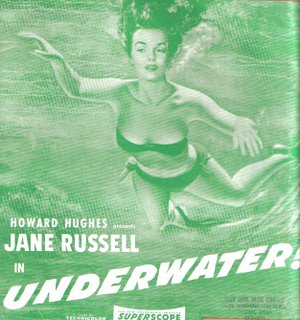
Howard Hughes' Waterloo
Muddy Waters, Mannish Boy.
Tennessee Ernie Ford, Sixteen Tons.
Etta James, W-O-M-A-N.
Jeri Southern, An Occasional Man.
What makes a man? What makes a woman? How much of what we perceive of manhood, for example, is mere communal delusion? Impossible questions answered in pop songs.
"Mannish Boy" and "Sixteen Tons" define manhood in terms of getting some respect. Muddy Waters does so with swagger and confidence (and he's got some witnesses, in the form of the guys in the studio who shriek with approval every time Muddy notes that he's a man), while Tennessee Ernie Ford offers a form of cool braggadocio that seems to border on the psychotic, as witnessed in the badass lines:
If you see me coming
better step aside
A lotta men didn't
A lotta men died
But when you grow weary of male bluster, enjoy Etta James' sexy and laid-back response. She's seen and heard it all before, and has had her fill of the jive talk and boasts from men with empty pockets. When you come down off the roost, come see about me.
Jeri Southern is tired of the game as well: "An Occasional Man" is her Pacific fantasy, where she resides in tropical bliss and gets her pick of the crop in terms of the local men (who seem to get the boot as soon as she's done with them).
"Mannish Boy," recorded on May 24, 1955, with Willie Dixon on bass and possibly Little Walter on harmonica, is essentially the same tune as Bo Diddley's "I'm a Man," recorded two months earlier (the legend goes that Muddy walked in on Diddley auditioning the song to Leonard Chess and wanted to take it, figuring this Diddley guy was a nobody; when that wasn't an option, Muddy basically rewrote it). A decade later, both tracks would inspire a generation of spotty British and American youth, who took the songs' undeniable claims to manhood (in a country like the United States in 1955, a Mississippi-born African-American man saying "I'm a man" was a revolutionary statement) and transformed them into a way to dignify a teenage boy's lust--the Yardbirds' "I'm a Man" being the most notable result. In 1976, Waters performed "Mannish Boy" at the Band's "Last Waltz" concert, and Waters is the centerpiece of the Scorsese film that came out two years later--smiling, virile, demanding the camera's complete attention--making the coked-out rock stars supporting him look a bit ridiculous. On Anthology.
Merle Travis' "Sixteen Tons" was recorded by Ford in Hollywood on September 20, 1955, and released as Capitol 3262. Part novelty (a song that sounded like a Depression-era union anthem that hit #1 in the waning days of McCarthyism), part rock & roll experiment on the part of Ford and Capitol, it was a colossal hit, selling a million copies in two months. On Greatest Hits (where Tennessee looks like Walt Disney on the cover).
"W-O-M-A-N" was one of Etta James' first singles, consolidating the presence she had established with "Roll with Me Henry" and "Good Rockin' Daddy"; Recorded in October 1955 and released a month or so later as Modern 972. On R&B Dynamite.
Jeri Southern, reclusive, beautiful and brilliant, is the most underrated female vocalist of the '50s. Hugh Martin and Ralph Blane's "An Occasional Man" was recorded on July 27, 1955, and released as Decca 9-29647. On The Very Thought of You.
No comments:
Post a Comment